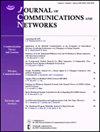一种新的基于聚类联邦学习的移动流量预测组管理方案
IF 2.9
3区 计算机科学
Q2 COMPUTER SCIENCE, INFORMATION SYSTEMS
引用次数: 0
摘要
本研究开发了一种新的基于集群联合学习(FL)的群组管理方案,用于移动边缘计算(MEC)系统中的移动流量预测(简称FedGM)。在FedGM中,为了提高FL过程中的收敛时间,我们考虑首先根据多个MEC服务器的地理位置和增强的数据模式对其进行聚类,作为聚类的参考。在每个集群中,通过减轻MEC服务器异构性造成的掉队者影响,我们设计了一个组管理方案,该方案通过最小化MEC服务器的平均空闲时间和组创建成本来优化i)要创建的组的数量和ii)MEC服务器的组关联。为此,我们严格制定了本地训练计算时间的分析模型,并通过在MEC服务器上应用不同频率的本地训练来估计平均空闲时间。优化问题是使用非凸问题设计的,因此设计了一种基于遗传的启发式方法来确定次优解。通过减少平均空闲时间,从而增加MEC服务器的工作量,两个真实世界移动流量数据集的实验结果表明,FedGM在收敛速度方面超过了以前最先进的方法,但精度损失可接受。本文章由计算机程序翻译,如有差异,请以英文原文为准。
A novel group management scheme of clustered federated learning for mobile traffic prediction in mobile edge computing systems
This study developed a novel group management scheme based on clustered federated learning (FL) for mobile traffic prediction (referred to as FedGM) in mobile edge computing (MEC) systems. In FedGM, to improve the convergence time during the FL procedure, we considered multiple MEC servers to first be clustered based on their geographic locations and augmented data patterns as references for clustering. In each cluster, by alleviating the straggler impact owing to the heterogeneity of MEC servers, we then designed a group management scheme that optimizes i) the number of groups to be created and ii) the group association of the MEC servers by minimizing their average idle time and group creation cost. For this purpose, we rigorously formulated analytical models for the computation time for local training and estimated the average idle time by applying different frequencies of local training over the MEC servers. The optimization problem was designed using a non-convex problem, and thus a genetic-based heuristic approach was devised for determining a suboptimal solution. By reducing the average idle time, thereby increasing the workload of the MEC servers, the experimental results for two real-world mobile traffic datasets show that FedGM surpasses previous state-of-the-art methods in terms of convergence speed with an acceptable accuracy loss.
求助全文
通过发布文献求助,成功后即可免费获取论文全文。
去求助
来源期刊
CiteScore
6.60
自引率
5.60%
发文量
66
审稿时长
14.4 months
期刊介绍:
The JOURNAL OF COMMUNICATIONS AND NETWORKS is published six times per year, and is committed to publishing high-quality papers that advance the state-of-the-art and practical applications of communications and information networks. Theoretical research contributions presenting new techniques, concepts, or analyses, applied contributions reporting on experiences and experiments, and tutorial expositions of permanent reference value are welcome. The subjects covered by this journal include all topics in communication theory and techniques, communication systems, and information networks. COMMUNICATION THEORY AND SYSTEMS WIRELESS COMMUNICATIONS NETWORKS AND SERVICES.

 求助内容:
求助内容: 应助结果提醒方式:
应助结果提醒方式:


